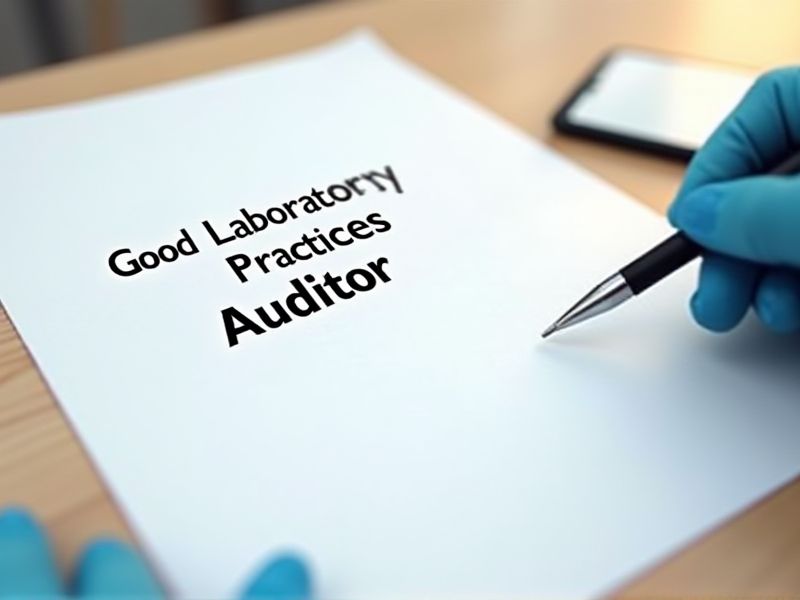
Good Laboratory Practices (GLP) Auditors play a critical role in maintaining the integrity and quality of laboratory data, necessitating a comprehensive understanding of regulatory standards. Certifying bodies often require auditors to demonstrate specific competencies to ensure adherence to GLP principles, which can include knowledge of documentation, quality assurance, and risk management. Certifications provide a structured framework for skill assessment and validation, enhancing credibility and trustworthiness in the field. Key certifications are essential for anyone pursuing a career as a GLP Auditor.
Certified GLP Auditor
A Certified GLP Auditor ensures compliance with Good Laboratory Practices (GLP), crucial for maintaining data integrity and reliability in laboratory settings. Having a qualified auditor minimizes the risk of errors or fraudulent practices that could compromise research outcomes. Certified auditors bring a standardized approach, enabling comparisons and efficiency across different labs and studies. Their expertise helps in identifying and addressing gaps in current lab processes, thereby enhancing the overall quality of laboratory outputs.
ISO/IEC 17025 Auditor Certification
ISO/IEC 17025 Auditor Certification is crucial for Good Laboratory Practices Auditors to ensure their evaluations adhere to recognized international standards, enhancing credibility and trust in their assessments. This certification provides auditors with up-to-date knowledge of the laboratory testing and calibration process, promoting consistency and accuracy across evaluations. It enables auditors to identify gaps in laboratory compliance, driving improvements that align with global quality benchmarks. Organisations with certified auditors often witness improved operational efficiency and enhanced reputation, resulting from stringent adherence to validated processes and practices.
ISO 9001 Lead Auditor Certification
The ISO 9001 Lead Auditor Certification equips auditors with the skills to assess quality management systems, ensuring laboratories adhere to international standards. Because Good Laboratory Practices (GLP) emphasize quality and consistency, having a certified auditor ensures compliance and credibility. Certified lead auditors bring structured methodology to audits, identifying gaps and areas for improvement in laboratory systems. This enhances laboratory operations, mitigating risks of errors and promoting accuracy in testing and results.
Certified Quality Auditor (CQA)
Certified Quality Auditors bring a structured and standardized approach to evaluating laboratory practices, ensuring compliance with regulatory requirements. Their expertise in quality management systems directly impacts the reliability and accuracy of laboratory results. With CQA certification, auditors are equipped to systematically identify potential areas of risk and inefficiencies. This leads to enhanced laboratory credibility and trust in data-driven decision-making.
Six Sigma Green Belt Certification
A Six Sigma Green Belt Certification equips a Good Laboratory Practices Auditor with analytical skills to identify process inefficiencies. Enhanced problem-solving techniques from the certification enable auditors to implement strategies that ensure consistent quality and compliance. The training fosters a data-driven approach, which is crucial for maintaining rigorous standards in laboratory environments. A Green Belt certification also heightens knowledge in process optimization, leading to more efficient and reliable laboratory audits.
Certified Quality Improvement Associate (CQIA)
The Certified Quality Improvement Associate (CQIA) credential provides essential quality management principles, crucial for auditing laboratory practices effectively. Familiarity with process improvement techniques enables Good Laboratory Practices Auditors to identify inefficiencies in laboratory operations. Knowledge acquired through CQIA helps in ensuring compliance with regulatory standards, reducing the risk of costly non-compliance penalties. Expertise in quality improvement fosters a culture of continuous improvement, enhancing the overall reliability and accuracy of laboratory results.
Good Manufacturing Practices (GMP) Auditor Certification
GMP Auditor Certification enhances a professional's ability to ensure that laboratory practices comply with regulatory standards. It provides comprehensive knowledge about identifying risks and implementing corrective measures in laboratories. Laboratories that adhere to GMP principles tend to produce more reliable and valid test results. Certification can elevate the credibility and trustworthiness of auditors in the eyes of industry stakeholders.
Regulatory Affairs Certification (RAC)
Regulatory Affairs Certification (RAC) provides a comprehensive understanding of the regulatory frameworks, essential for ensuring compliance during audits. Possessing RAC credentials enhances the credibility of a Good Laboratory Practices (GLP) auditor by demonstrating expertise in relevant laws and guidelines. This certification equips auditors with the necessary skills to assess and interpret regulatory requirements accurately, reducing the risk of non-compliance. The RAC validates the auditor's proficiency in staying current with evolving regulations, essential for maintaining the integrity of laboratory practices.
Certified Risk Management Professional (CRMP)
A Certified Risk Management Professional (CRMP) equips a Good Laboratory Practices Auditor with skills to identify potential risks in lab operations, ensuring compliance with regulations. This certification enhances an auditor's capability to implement comprehensive risk assessment procedures, reducing the probability of costly errors or accidents. Having a CRMP designation improves the auditor's credibility when interfacing with regulatory bodies and stakeholders. In-depth knowledge gained from CRMP training enables proactive risk mitigation strategies, safeguarding the integrity and reliability of laboratory results.
Good Clinical Practice (GCP) Certification
Good Clinical Practice (GCP) Certification ensures that a Good Laboratory Practices Auditor possesses a comprehensive understanding of ethical standards and regulatory guidelines in clinical trials. This certification enhances the auditor's ability to evaluate and ensure data integrity and subject safety within laboratory practices. By having GCP Certification, auditors can effectively identify potential discrepancies between laboratory operations and clinical requirements. Employers and clients gain confidence in the auditor's expertise, promoting consistency and reliability in laboratory audits.
Summary
As a Good Laboratory Practices (GLP) Auditor, obtaining certifications may bolster your credibility and demonstrate expertise in adhering to regulatory standards. Certification enhances your competitiveness in the job market by showcasing your commitment to continuous improvement and professional development. Employers are more likely to trust your assessment capabilities, as the certification reflects a validated understanding of GLP protocols. This recognition can lead to career advancement and potentially higher compensation.
